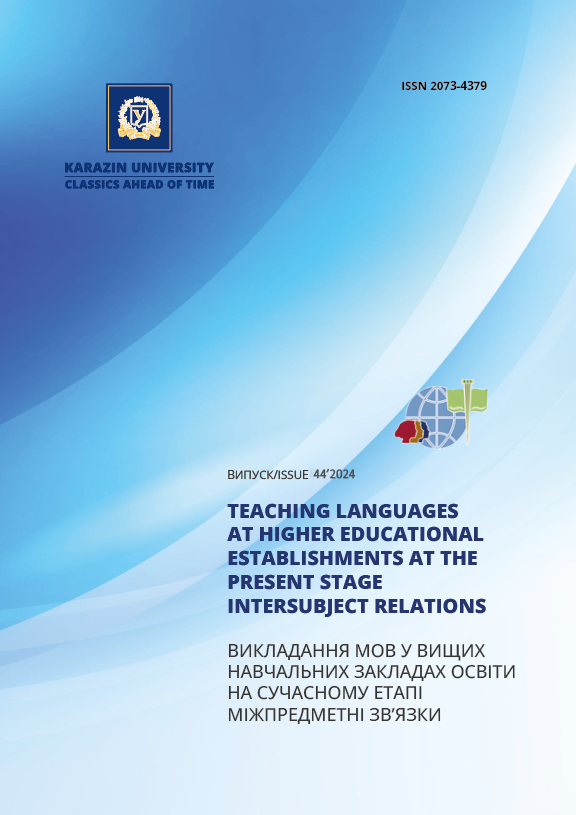Інтеграція м’яких умінь у програму з морської англійської мови
Анотація
У галузі морських перевезень потенційно зацікавлені сторони мають значний вплив на створення та модифікацію стандартів міжнародних транспортних систем і формують запит на підготовку висококваліфікованих фахівців. Упровадження цифрових технологій, автоматизація операцій, глобалізація міжнародної морської торгівлі створюють нові виклики та підвищують вимоги до професійних компетентностей членів екіпажів торгівельних суден.
Останні дослідження сучасного стану та перспектив розвитку галузі вказують на потребу в опануванні нових професійних умінь. Представники морської індустрії добре усвідомлюють вплив людського фактора на ефективність процесів на судні й наголошують на необхідності реформування морської освіти. Виокремлення м’яких умінь в якості мети навчання сприятиме формуванню майбутніх лідерів і, зрештою, покращенню якості професійної підготовки членів екіпажів та підвищенню ефективності їхньої праці. Таким чином, існує об’єктивна необхідність обґрунтувати значення м’яких умінь, характерних для професії моряка, та описати підходи щодо їхньої інтеграції в освітній процес.У статті розглянуто декілька визначень поняття «м’які уміння», запропонованих вітчизняними та іноземними дослідниками. На підставі аналізу наукових праць сформульовано визначення м’яких умінь, яке вважаємо доцільним для нашого дослідження. М’які вміння – це індивідуальні психологічно-поведінкові властивості, які реалізуються у міжособистісній взаємодії і сприяють її ефективності.
Мета статті – запропонувати підходи щодо інтеграції м’яких умінь у програму з морської англійської мови в закладі вищої освіти.
З метою планування подальших напрямів роботи з курсантами щодо розвитку м’яких умінь проаналізовано висновки актуальних міжнародних проєктів. Найбільш ефективним підходом визначено інтеграцію м’яких умінь у програму з морської англійської мови, оскільки більшість методів навчання та навчальних матеріалів цієї дисципліни спрямовано саме на розвиток умінь ефективної міжособистісної комунікації.
Поданий у статті матеріал може бути корисним для науковців, викладачів закладів вищої освіти, які задіяні у процесі системного впровадження м’яких умінь в освітній процес.
Завантаження
Посилання
Didenko, Zh. (2021). The Development of Future Managers’ “Soft Skills” in English Lessons Through Distance Learning. Aktualni pytannia humanitarnykh nauk [Humanities Science Current Issues]. Issue 35, Vol. 2. pp. 266-271. DOI: https://doi.org/10.24919/2308-4863/35-2-41 [in Ukrainian].
International Convention on Standards of Training, Certification and Watchkeeping for Seafarers 1978 (consolidated text with the Manila amendments). (2012). Kyiv: VPK “Ekspres-Polihraf” [in Ukrainian].
Tkachenko, N., Yuan Wenjing. (2022). Transverse Competences: The Evolution of a Concept Through the Prism of Contexts. Scientific Innovations and Advanced Technologies. 5 (7), pp. 130-143. DOI: https://doi.org/10.52058/2786-5274-2022-5(7)-130-143 [in Ukrainian].
Cimatti, B. (2016). Definition, Development, Assessment of Soft Skills and Their Role for the Quality of Organizations and Enterprises. International Journal for Quality Research, 10 (1), pp. 97-130. DOI: https://doi.org/10.18421/IJQR10.01-05
Kudryavtseva, V., Barsuk, S., Frolova, O. (2023). Maximizing Students’ Learning in Maritime English Online Course. Pedagogika-Pedagogy. Vol. 95, No 95s, pp. 122-138. DOI: https://doi.org/10.53656/ped2023-5s.11
Lekakou, M., Iakovaki, H., Vintzilaios, D. et al. (2023). Introducing the Use of Case Studies Methodology in Training for Soft Skills in Maritime Universities. The ISOL-MET Program. Pedagogika-Pedagogy. Vol. 95, No 95s, pp. 111-122. DOI: https://doi.org/10.53656/ped2023-6s.10
Lutzkanova, S., Mednikarov, B., Chesnokova, M. (2022). Enhancing “Soft Skills” Management for Maritime and Shipping Business Personnel Using Interactive Educational Methods. Proceedings of the International Association of Maritime Universities Conference, pp. 247-251.
Ölçer, A.I., Kitada, M., Lagdami, K. et al. (2023). Transport 2040: Impact of Technology on Seafarers – The Future of Work. Malmö: World Maritime University. DOI: http://dx.doi.org/10.21677/230613
Sirbu, A., Georgescu, M. (2023). English Classes as an Intrinsic Part of the Soft Skills Development of Marine Students. IMLA 28/IMEC 33 Conference Proceedings, pp. 86-92.
SkillSea Project (Project number 601186). Rotterdam: STC-Group. (2023). Available at: https://www.skillsea.eu/images/Public_deliverables/D1.1.2-Current-skills-needs-final_28-06-2023.pdf [Accessed 11 Jan. 2024].
Spirovska Tevdovska, E. (2015). Integrating Soft Skills in Higher Education and the EFL Classroom: Knowledge Beyond Language Learning. SEEU Review. Vol. 11, Issue 2, pp. 97-108. DOI: https://doi.org/10.1515/seeur-2015-0031
The Key Role of Seafarers in National Economies in a Net-Zero World / International Chamber of Shipping. (2023). Available at: https://www.ics-shipping.org/wp-content/uploads/2023/06/SEAFARERS-REPORT-final.pdf [Accessed 15 Jan. 2024].
Davis, C., Wright, J., Cameron, S. (2022). The Maritime Professional Council Report on Kind Leadership. Available at: https://www.mpc-uk.org/wp-content/uploads/2023/10/MPC-Kind-Leadership-Report.pdf [Accessed 21 Jan. 2024].
Vasanthakumari, S. (2019). Soft Skills and Its Application in Work Place. World Journal of Advanced Research and Reviews. 3 (2), pp. 66-72. DOI: https://doi.org/10.30574/wjarr.2019.3.2.0057

